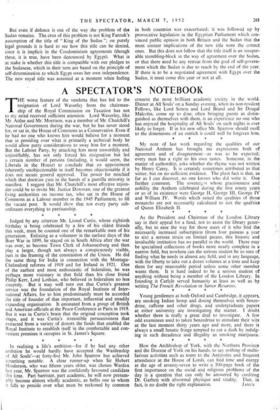Judged by any criterion Mr. Lionel Curtis, whose eightieth birthday
is being celebrated by a few of his oldest friends this week, must be counted one of the remarkable men of his generation: Enlisting as a volunteer in the earliest days of the Boer War in 1899, he stayed on in South Africa after the war was over, to become Town Clerk of Johannesburg and then play a larger, though not always a conspicuously visible, part in the framing of the constitution of the Union. He did the same thing for India in connection with the Montagu- Chelmsford reforms of 1919 and for Ireland in 1921. ,One of the earliest and most enthusiastic of federalists, he was perhaps more visionary in that field than his close friend Philip Kerr, Lord Lothian, who believed in federalism no less sincerely. But it may well turn out that Curtis's greatest service was the foundation of the Royal Institute of Inter- national Affairs, for to him predominantly must be accorded the title of founder of that important, influential and steadily expanding organisation. It emanated from a group of British and American officials at the Peace Conference at Paris in 1919. But it was in Curtis's brain that the original conception took shape, and it was Curtis's irresistible persuasiveness that extracted from a variety of donors the funds that enabled the Royal Institute to establish itself in the comfortable and con- venient premises it occupies in St. James's Square.
* * * *


































 Previous page
Previous page